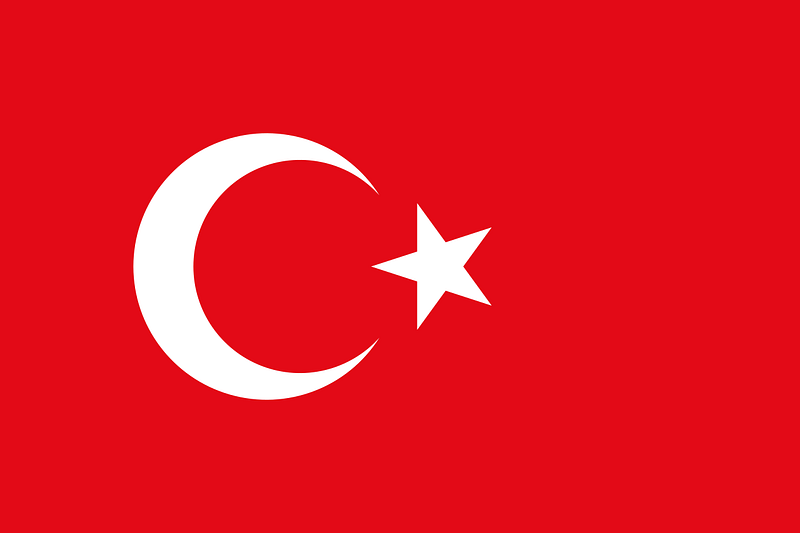This travel wiki page for the Republic of Turkey will help guide travelers with quick and relevant information to consider when planning and visiting the country. It is difficult to find all the relevant information you need on culture, safety, things to do, and travel restrictions, so we summarize it all here. These data will be updated periodically, and if anything is stale or outdated, please reach out and let us know! Let’s dive in and learn more high-level information and exciting facts as a Turkey trip planner!
Posted September 11, 2022 – Last updated May 5, 2024
Table of contents
National Information & Culture
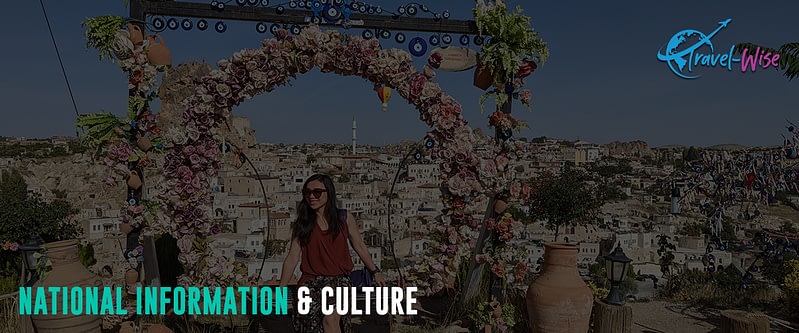
The Republic of Turkey (Türkiye) is a country that lies mainly in Anatolia in West Asia and partly in East Thrace in Europe. It borders the Black Sea to the north and land borders with Georgia, Armenia, Azerbaijan, Iran, Iraq, Syria, Bulgaria, and Greece. Hence, Turkey has a diverse culture that blends various elements of Eastern Mediterranean, Eastern Europe, Caucasus, Central Asia, and Middle Eastern traditions. The fact that it is home to many communities that have left traces of religious, ethnic, and cultural heritage has played a significant role in forming this culture. It can be seen in various artistic elements, traditions, beliefs, languages, or dialects of that region that live in each city of Turkey.
Most Turks are devout (or at least conservative) Muslims, so visitors should adhere to local dress codes, especially when away from resorts and visiting mosques. For example, beachwear should be on the beach, and revealing clothing like miniskirts and skimpy shorts should be avoided in tourist areas. When visiting a mosque, dress modestly and cover your head (for women) and shoulder to upper arms for both sexes. Also, avoid your visit coinciding with noon prayers, especially on Friday.
One interesting fact about Turkey is its capital city. Many do not know that Ankara is the country’s capital, while Istanbul is its largest city and financial center. Meanwhile, the country’s official currency is the Turkish Lira.
Turkey is home to infinite locations that are beyond your wildest dreams! Full of ancient sites, unique beauty, and unparalleled destinations. Visiting the country can be an unforgettable experience one can imagine! Planning your trip can help you maximize your stay. The official web page of the Turkey Ministry of Tourism and Culture can give you helpful information, hints, and considerations for your visit.
Special Travel Considerations
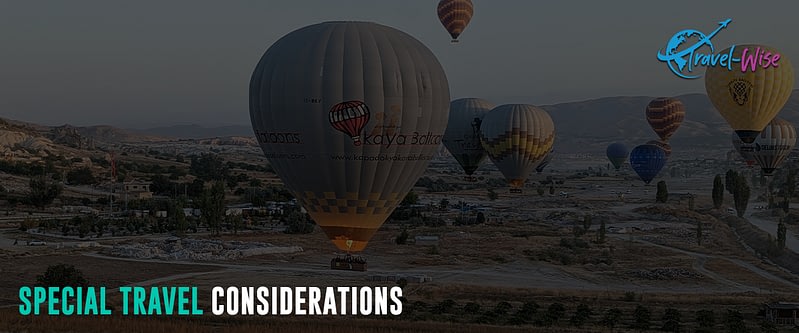
Each country and destination has rules and regulations that every traveler must consider. Hence, please consider the following factors for hassle-free travel to Turkey.
Travel Insurance
Travel insurance is not mandatory when entering Turkey. However, it is one of the requirements for a Turkish visa application. Flight cancellations, emergencies, accidents, and other unforeseen events can happen anytime. Therefore, while not required, it is always advisable to get travel insurance that covers emergency medical treatment, including COVID-19, repatriation, and evacuation. Travel insurance can protect you against the inconvenience of injury, medical emergencies, theft, and flight cancellations. In addition, it is comprehensive protection in case anything goes wrong with your trip.
Covid-19 Policy
As of June 17, 2022, the government of Turkey has repealed all COVID-19 restrictions. Hence, arriving passengers do not need to present vaccination certificates, negative COVID-19 test results, or quarantine upon arrival.
Visa Information
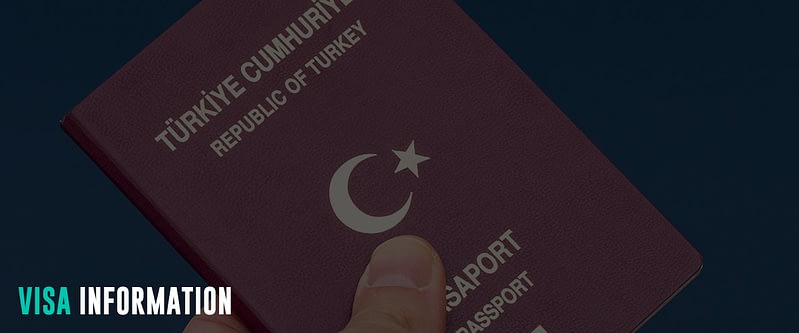
Not all countries have the privilege of visiting Turkey on a visa-free. So, travelers can check here whether they need a visa based on their passport country. Travelers can also check whether they are eligible to apply for Turkish e-visa in 3-easy steps: online application, make payment, and download.
Meanwhile, countries that are neither visa-free nor eligible for an e-visa can visit Turkey with a sticker visa. Travelers from these countries should contact the nearest Turkish Embassy or consulate to make an appointment and apply for their corresponding visa.
Popular Attractions
Turkey has a stunning location that surrounds Asia and Europe. It offers a conventional and modern vibe that captures a traveler’s heart. Its colorful community, famous cuisine, and, not to forget, the mixture of cultures win the hearts of millions of visitors every year, making it the world’s fourth most-visited country in 2022. Be sure to plan your travel to Turkey with enough time to hit all these highlights!
Istanbul
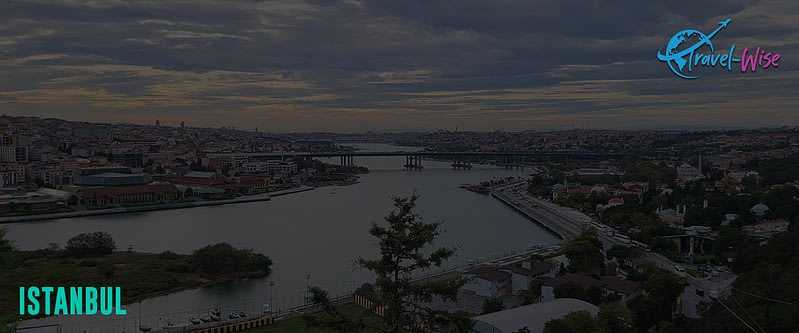
Istanbul, one of the busiest airports in the world, is the main entry point for tourists in Turkey. This city is full of charm, where the past goes hand in hand with the present. The top three sites are the Hagia Sophia, a 19th-century architectural wonder. The interior, which has housed a mosque, a church, and even a museum, will astound every tourist. Topkapi Palace, also known as the Topkapi Saray, is another must-see in Istanbul. Top features include a beautiful collection of Islamic art, plush gardens, and stunningly adorned chambers with exquisite hand-painted tilework. Finally, the Blue Mosque is a 17th-century structure with six minarets. It is another example of superb Muslim architecture and a must-see when you arrive in the city.
Cappadocia
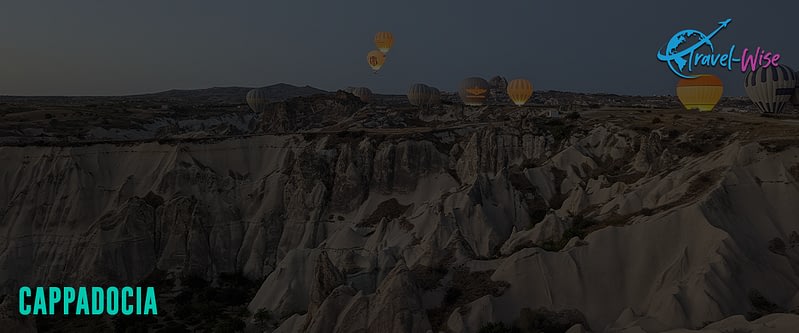
Cappadocia is a constant when discussing the top tourist destinations in the country. The city has a distinctive scenery created over time by winds and volcanoes. However, what makes the town popular is the hot air balloon flights, be it at dawn or dusk. It is fantastic to see the enormous fire-driven balloons flying over the valleys.
A must-see is the hamlet of Göreme. It is a UNESCO World Heritage Site and is home to several mystical rock-cut churches, called fairy chimneys, with artwork illustrating the significance of Byzantine theological principles along the interior walls. Also, many tourists enjoy tours of the underground bunkers of Kaymakl and Derinkuyu and admire the magnificent cathedrals at Avusin.
Fairy chimneys result from volcanic eruptions and human civilizations that shaped the landscape over millions of years.
Pamukkale
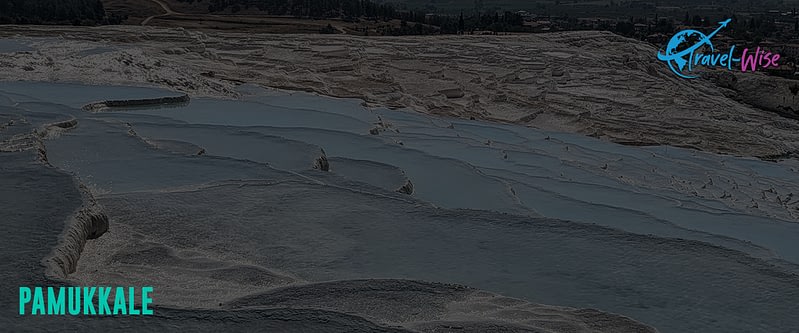
One of Turkey’s most famous natural wonders is Pamukkale’s pure white travertine terraces, which means “cotton castle” in Turkish. It cascades down the slope like a snowfield amid the green landscape.
Another highlight of the city is the vast and rambling ruins of Greco-Roman Hierapolis, with much of its original structure preserved. It was built on top of the travertine formation and has remnants of what used to be the ancient city’s agora, gymnasium, necropolis, and grand gates. Hierapolis became a UNESCO World Heritage Site in 1988.
Cleopatra’s Antique Pool, also known as Pamukkale Ancient Pool, is between the museums and the Temple of Apollo. It is a hot spring, where the water stays at 36 degrees Celsius all year round. Thermal waters are famous for their soothing effect properties. But what’s unique about the pool are the marble columns, plinths, and capitals scattered at the bottom. These date back to the 2nd century B.C. and are remnants from the nearby Temple of Apollo. So isn’t it a fantastic place to swim, with actual Roman column ruins dating back from the time before Christ?
Antalya
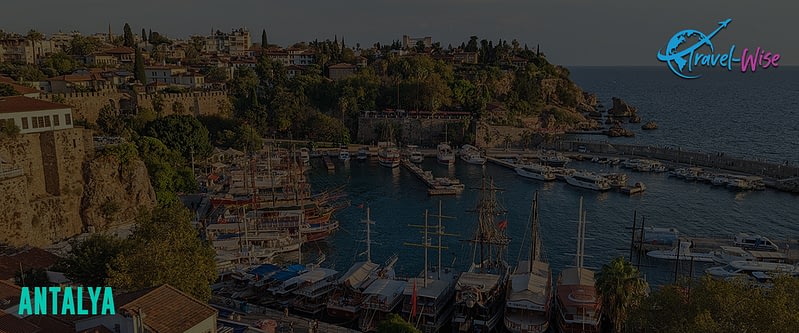
Antalya is one of Turkey’s top vacation spots and the fifth-largest city. It has some of Europe’s finest beaches, including Konyaalti Beach. The Antalya Museum is one of the best in the world, with a beautiful range of ancient Greek and Roman marble sculptures, making it an excellent base for exploring the area. Aspendos is the historical enthusiast’s paradise in Antalya. It contains a magnificent Roman theater that can accommodate more than 10,000 people and is one of the best-surviving theaters from that period.
Bodrum
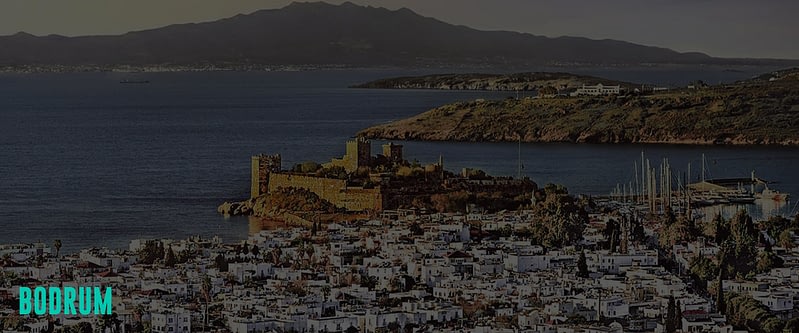
Bodrum, known for its warm shores, is the ideal place for beach bum vacationers. The city features twin bays with views of the Bodrum Castle, also known as the Castle of St. Peter, built in the 15th century. This castle was built partly with stones from the Mausoleum at Halicarnassus, one of the Seven Wonders of the Ancient World, completed in the 4th century B.C. The castle houses the Bodrum Museum of Underwater Archaeology, which exhibits mostly underwater artifacts, including shipwrecks.
Ephesus
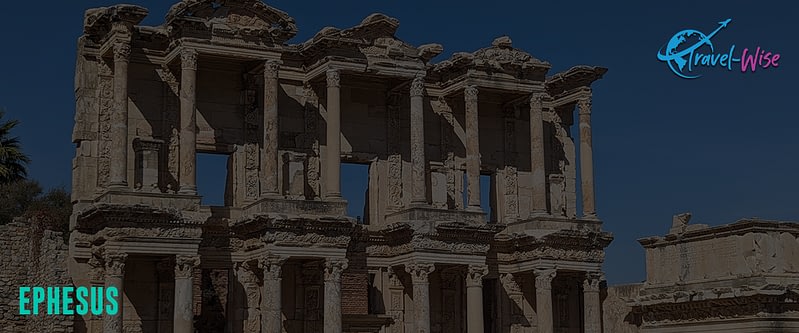
The mighty ruin of Ephesus is a city of colossal monuments and marble-columned roads. Having one of the most complete, still-standing, famed cities of antiquity in the Mediterranean region, this is the place to experience what life must have been like during the golden age of the Roman Empire. In particular, the Library of Celsus, the complex of frescoed terraced houses, and the Great Theater all point to the wealth and importance of Ephesus during the Roman period dating back to the 10th century BCE.
Koprulu Canyon
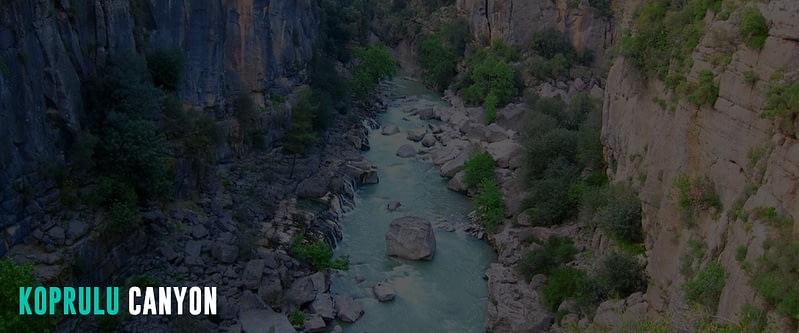
Koprulu Canyon National Park is one of the most significant sites to visit in Turkey. It is known for its various water sports activities that tourists may participate in. The hiking paths with unusual vistas and abundant breathtaking Mediterranean picturesque splendor are unmatched. It has a gorgeous valley ideal for exploration, such as snorkeling, zip-lining, camping, rafting, trekking, or simply soaking in the natural splendor. It is located high in the mountains, 96 km from Antalya.
Mount Nemrut
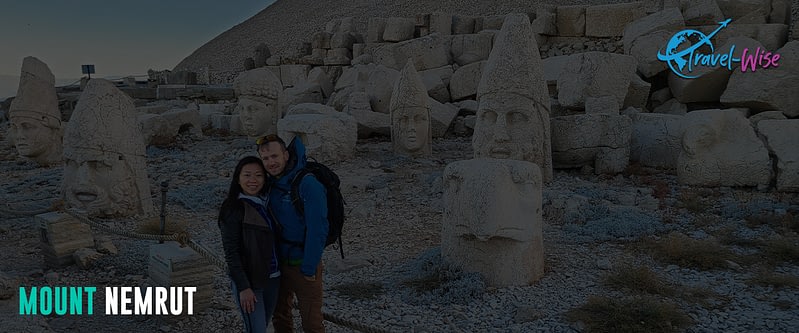
Mount Nemrut is a UNESCO World Heritage Site in southeast Turkey, where you can find one of the most remarkable monuments of the ancient world. On top of a 2,134-meter-high mountain is a tumulus surrounded by colossal statues of gods and kings from the Commagene Kingdom, which ruled this area in the first century BC. The statues are primarily headless due to earthquakes and vandalism but still have an imposing presence. You can hike up to the summit and admire the sunrise or sunset over the statues and the surrounding landscape.
Eight Fun Facts About Turkey
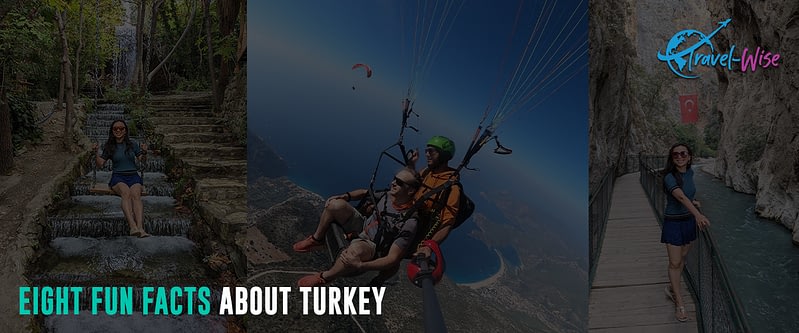
There is no doubt that Turkey is a fascinating country, owing to its rich history, culture, and geography. Here are some fun facts:
Turkey is the only country in the world that spans two continents, Europe and Asia.
About 97% of Istanbul’s territory is in Asia, while the remaining 3% is in Europe. The Bosphorus Strait divides Istanbul, connecting the Black Sea and the Sea of Marmara and separating the two continents.
Turkey is home to two of the Seven Wonders of the Ancient World.
The Temple of Artemis and the Mausoleum of Halicarnassus. The Temple of Artemis was a huge marble temple dedicated to the goddess of hunting and nature, located in Ephesus. It was destroyed by a fire in 356 BC, allegedly set by a man named Herostratus, who wanted to become famous. The Mausoleum of Halicarnassus was a monumental tomb built for King Mausolus of Caria, who died in 353 BC. It was adorned with sculptures and reliefs and stood for over 1,600 years until earthquakes damaged it.
Turkey introduced tulips to the world.
Although tulips are often associated with the Netherlands, they were initially cultivated in Turkey during the Ottoman Empire. The word “tulip” comes from the Turkish word “tülbent,” meaning “turban,” because of the flower’s shape. Tulips were highly prized and became a symbol of wealth and power. In the 17th century, some tulip bulbs were worth more than gold in Europe, causing a phenomenon known as “tulip mania.”
Turkey has one of the world’s oldest and largest covered markets
The Grand Bazaar in Istanbul dates back to the 15th century and covers an area of 61 streets and over 4,000 shops. It attracts between 250,000 and 400,000 visitors daily, making it one of the most visited tourist attractions in the world. In the Grand Bazaar, you can find anything from carpets to jewelry, spices, antiques, leather goods, and souvenirs.
Turkey has a dessert made from chicken.
Tavuk göğsü means “chicken breast” in Turkish. It is a traditional pudding made from boiled chicken, milk, sugar, rice flour, and cinnamon. The chicken is shredded into very fine strands and mixed with the other ingredients until smooth and creamy. It is served cold and sprinkled with powdered sugar or pistachios.
Turkey has an annual camel wrestling festival.
The Selçuk Efes Camel Wrestling Festival dates back over 2,000 years when Turkic people brought camels to Anatolia. The camels are specially bred and trained for wrestling and wear colorful decorations and bells. The wrestling matches occur between two male camels provoked by a female camel in heat. The winner is the one who makes the other camel retreat or fall.
Turkey has one of the most diverse wildlife in Europe
Over 80,000 species of animals live in Turkey. Some rare and endangered species in Turkey are the Anatolian leopard, the Mediterranean monk seal, the brown bear, the striped hyena, and the loggerhead turtle. Turkey also has over 10,000 species of plants, many of which are endemic to the country.
Turkey has one of the oldest underground railways in the world.
Tünel is a funicular railway that connects Beyoğlu and Karaköy districts in Istanbul. It was opened in 1875 and became the second underground railway in the world after the London Underground. It is also one of the oldest surviving rail lines in continental Europe. Tünel covers a distance of 573 meters and takes only 90 seconds to travel between its two stations.
Primary Spoken Language(s)
Turkish is the official language spoken by 85.54% of the population and is considered the first language. The Kurmanji dialect of Kurdish as their mother tongue, consisting of 11.97% of the people, follows. The remaining 2.39% of the population speaks Arabic; Zaza is the mother tongue and a few other languages.
Safety Concerns

Turkey is a relatively safe destination for travelers despite ranking 147th out of 163 countries on the 2023 Global Peace Index. As of July 26, 2023, Turkey has a Level 2 Travel Advisory from the US Department of State. Hence, travelers are advised to practice some safety precautions.
The country’s commitment to tourism can be seen in its robust safety measures implementation, ensuring visitors enjoy its offerings without undue concerns. Turkey ranked the world’s fourth most visited country in 2022, with 50.5 million foreign tourist arrivals. Similarly, Istanbul is the world’s most visited city, with 20.2 million visitors in 2023.
With its regional location, the threat of terrorism is present in Turkey. The threat of terrorist attacks, violence, and acts of war is high along the borders with Syria and Iraq. Hence, avoid traveling near the borders of Syria and Iraq. Also, avoid going near demonstrations and protest areas. Monitor the news and follow the advice of local authorities.
Overall, street crime in Turkey is low. Reports show that pickpocketing and bag snatching are common crimes around tourist sites. So, when in Istanbul, watch out for your valuables and belongings while exploring Taksim Square, Sultanahmet, the Grand Bazaar, and the Spice Bazaar. Keep a low profile, and be mindful of your surroundings to avoid these incidents. Also, pay close attention to your belongings, particularly on public transport and in crowded places.
In an emergency, dial the hotline number 112.
Natural Hazard
According to the 2018 revised Turkey Earthquake Hazard Map, nearly all of Turkey is vulnerable to seismic risk. This is due to the country’s location, where three tectonic plates meet: the Anatolian, Eurasian, and Arabian. Last February 2023, a 7.8-magnitude earthquake hit Gaziantep and neighboring provinces in the southeast of Turkey, resulting in heavy infrastructure damage and deaths. Hence, familiarize yourself with earthquake safety precautions when planning a trip to Turkey.
Budget Considerations

Traveling in Turkey is relatively inexpensive compared to European countries. Hence, tourists from North America, Australia, and Europe can get the most for their money while visiting Turkey. Some budget considerations when traveling are accommodation, food, transportation, attraction costs, and the travel season.
Like all other countries, flying to Turkey outside the high season, from May to September, is the cheapest. In Turkey, May and September are the shoulder seasons, with October to March being the low seasons. If you can travel during shoulder season, then consider it. Not only will the weather be perfect, but prices will be lower, there will be fewer crowds, and accommodation will be emptier.
Accommodation
Budget accommodations and hostels are scattered throughout, even in smaller cities and towns. Rates usually vary according to location and proximity to the city center.
The average private room price in a good-location hostel is $20 per night, but check the reviews before booking one. Hostels are widely available in Turkey, where a dorm bed starts at $8 per night and $35 for a private room. Free Wi-Fi is standard; many hostels include complimentary breakfast and self-catering facilities. Travelers can also find budget hotels for $50. Similarly, staying at Airbnb properties costs around $50 for a studio apartment. For more comfort, visitors can stay in a 3-star hotel for $70 and a 5-star hotel for $100.
Food
Turkey’s staples are rice, wheat, vegetables, and lamb or beef meat. Popular cuisines include the national dish kebab, manti, and baklava.
Food is generally cheap. Depending on one’s preference, one can have three good meals a day for $10 at local food stalls. Travelers can also find fast food combo meals for $6 or spend $7.50 in a cheap Turkish restaurant. Meanwhile, occasional dining in a nice restaurant will require you to allocate a budget of $15. Travelers who want to go grocery shopping and cook can expect to spend between $ 50 and $60 weekly on basic staples like rice, eggs, fresh produce, and meat.
Attraction and Transportation
Admission fees to tourist attractions and destinations in Turkey vary. For example, the Blue Mosque and Grand Bazaar are open and accessible to the public, while Hagia Sophia admission is $27. Additionally, visitors can visit the Topkapi Palace for $23.
On the other hand, traveling by public transportation in Istanbul starts at $0.50, while renting a car costs around $25 daily on a 7-day booking.
Average Two-Week Cost
Budget travelers in Turkey can live with a $50 daily budget or $700 for two weeks. It covers the costs of staying in a hostel dorm bed, eating cheap street food, cooking most meals, and taking public transportation. On this budget, travelers mainly do free activities like visiting free attractions.
Meanwhile, travelers can comfortably stay in a 3-star hotel on a mid-range budget of $150 daily or $2100 in two weeks. The budget also includes dining out at local and mid-range restaurants, taking occasional taxis, and doing a few paid tours and activities.
Lastly, travelers can enjoy luxury in Turkey from $200 daily to $2800 for two weeks. It includes staying in a five-star hotel, dining anywhere, vehicle rental, and availing all the paid tours and activities they want. So, for them, the sky is the limit for travel.
However, note that travel expenditures can be unlimited. You may spend less today if you explore and do free activities and more the following days when taking paid tours and excursions.
Customs And Import Restrictions

Importing drones into Turkey is not possible in most cases. Drones must be registered, which is only possible for individuals with a Turkish ID card. An exception is for drones lighter than 500 grams but must follow strict flying rules. Authorities will confiscate your drone if you fly it in a restricted area or above 120 meters. Check out the complete guidelines and registration on unmanned aircraft systems (UAS) through the Directorate General of Civil Aviation web page.
Foreign and Turkish currency can be brought into Turkey without restriction. However, travelers cannot export more than 5,000 US dollars or the equivalent in Turkish or foreign currencies when leaving the country. Amounts exceeding this must be declared.
Consider checking out the arriving passengers’ Customs guide to Turkey for a smooth trip.
Climate Considerations

The northern part of Turkey is located in the temperate climatic zone, while the southern part is subtropical. In the warmer season, a beach holiday can be enjoyed with water temperatures up to 25 degrees. Southeast Anatolia is the country’s warmest and rainiest part, while the Black Sea Region is the coldest. Due to the warmer temperatures, the best time for traveling is from June to September. Less attractive are the cold months from November to March.
Further consideration may depend on your travel persona. Let’s say you are a culturalist. If so, you might enjoy the spring (April-May) or autumn (September-October) seasons when the weather is mild and pleasant and the crowds are smaller. Explore the historical sites of Turkey, such as Ephesus, Troy, and Hagia Sophia, and learn about their stories and secrets. During these months, flights and hotels are also cheaper.
If you enjoy the sun, the sea, and festivals, you might prefer the summer (June-August) season. When the weather is hot and sunny, the beaches are inviting. You can relax on the beautiful shores of the Mediterranean and Aegean seas, enjoy lively nightlife, and attend fun events like the Istanbul Jazz Festival and the International Bodrum Ballet Festival.
You can enjoy an adventure in Turkey during the winter months (November-March) when the weather is cold and snowy. Snow covers some fantastic places, such as the fairy chimneys of Cappadocia or Mount Nemrut’s colossal statues, so that you can have a peaceful and quiet time.
Primary Transportation Options
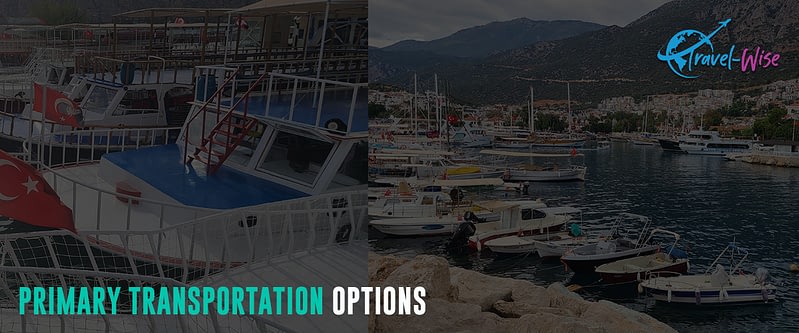
The public transport system in Turkey is very convenient, efficient, and reasonably priced. Therefore, getting around is easy, as the country offers various transportation options. These include planes, buses, trains, minibusses (dolmus or minibus), and subways (in major cities).
Air
Traveling by plane is a great way to explore Turkey’s vast network of destinations. With nearly 60 airports, 20 of which are dedicated to domestic travel, reaching hidden gems or bustling cities is a breeze. Major airports include Istanbul, Ankara, Antalya, and Cappadocia.
Turkish Airlines is the national carrier for a comfortable journey. Budget travelers have options, too, with Pegasus Airlines and SunExpress offering competitive prices. Other airlines operating in Turkey are Anadolujet, Onur Air, and Atlas Jet.
Ferry
Turkey’s stunning coastline is best experienced from the water. Ferries provide a scenic and relaxing way to travel between coastal towns and Greek islands. Major ferry companies like Bodrum Express, Sky Marine, Turyol, Akgunler Denizcilik, and Sea Dreams connect popular destinations like Bodrum, Marmaris, Kusadasi, and Cesme. With 39 years in the business, Zas Ferries offers ferry tickets and connects various ports in Turkey and Greece. Operating in Istanbul, IDO Istanbul Fast Ferries provides ferry services across the Sea of Marmara, including routes to Yalova and Mudanya.
For shorter hops across bays or to nearby islands, expect fares around $0.60 and $1.55. International routes, like Greece to Turkey, can cost slightly more.
Train
The primary rail carrier in Turkey is the Türkiye Cumhuriyeti Devlet Demiryolları (TCDD), also known as Turkish State Railways. TCDD is responsible for all long-distance and cross-border freight and passenger trains and manages most industrial lines within the country. Meanwhile, high-speed YHT trains connecting major cities like Istanbul, Ankara, and Konya offer a comfortable and swift option, with fares starting at around $1.55 for shorter stretches.
For a more traditional experience, opt for regional or intercity trains, where tickets can be as low as $0.95. While slower, these journeys reveal charming towns and breathtaking countryside views.
Bus and Dolmus
Turkey’s efficient bus network offers a budget-friendly way to navigate the country. Major bus companies like Metro Turizm, Varan Turizm, Kamil Koç, and Pamukkale operate comfortable intercity coaches with air conditioning and frequent departures. Additionally, they have modern buses with Wi-Fi onboard and comfortable reclining seats for long journeys. Some prominent bus companies offer airline-quality service, with online ticket reservation and sales systems. Fares are still very reasonable at around $1.55 to $3.10.
For shorter distances and local travel, hop on a dolmuş, a minibus following a set route. Fares are cheaper, typically around $0.50, payable directly to the driver. Signal your intention to stop by raising your hand, and don’t forget to tell the driver your destination beforehand.
Most towns have a bus station linked to the city center by free shuttle bus. Thus, this can be the best option for tourists to explore every attraction on your list! Lastly, some apps can help you get around Turkey. Consider having one before your trip!
Taxi
Taxis are readily available in most Turkish cities and tourist areas. Unlike a centralized company, taxis are typically owner-operated and flagged down on the street.
Ensure the meter is running before your journey begins. Fares are reasonable, with starting fees ranging from $0.55 and an additional $0.40 for each kilometer. The minimum fare is usually $1.25 to $1.80, while the average 5-kilometer taxi ride in Turkey costs between $3 and $4.50, depending on the city.
While BiTaksi is a popular ride-hailing app in Istanbul and Ankara, taxis remain the dominant form of short-distance travel in most areas. Like Bitaksi, iTaksi provides taxi services with various vehicle options. It operates in multiple cities across Turkey, including Istanbul. Notably, locals often prefer iTaksi over Uber.
Remember to negotiate fares beforehand if taking a taxi outside major cities or tourist zones. With a bit of planning, taxis can be a convenient way to travel during your Turkish adventure.
Car Rental
Exploring Turkey at your own pace offers unparalleled freedom. Car rentals are a popular option, with international and local companies available. Significant brands like Hertz, Avis, and Sixt offer familiarity and convenience, often with locations at airports and major cities.
Local companies like Cizgi Rent a Car, Budget, eCar, W Car, and Nokta Rent A Car can provide competitive rates, especially when booking online in advance. Depending on the car type and model, expect to pay at least $8 daily for an economy car rental for a week-long trip.
Remember, insurance and additional fees may apply. So, compare offers and read the fine print before booking. Also, note that Turkey drives on the right-hand side of the road.
Start Trip Planning

Travel-Wise is made from the ground up to help people travel more, break down the coldest barriers that make it challenging to get going, and start your journey as painlessly as possible. Bookmark our other Country Guides to help kick-start your research for future travels. We also offer templated itineraries from our staff and community that help serve as a building block for your trip plans. Alternatively, we also utilize AI to offer a way to generate itinerary ideas. It saves much time just getting you up and running with a template. From there, you can use the trip planner to create your customized itinerary, invite friends and family for collaboration, find others from Travel-Wise to join the trip, book and track important information, journal, and share your experiences at the end or along the way!

